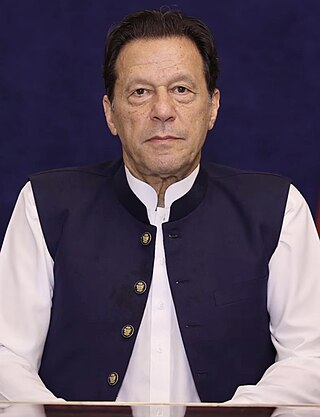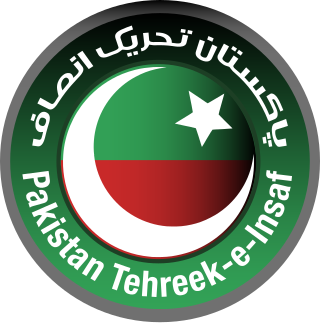
Imran Ahmed Khan Niazi is a Pakistani politician and former cricketer who served as the 19th prime minister of Pakistan from August 2018 until April 2022. He is the founder and former chairman of the political party Pakistan Tehreek-e-Insaf (PTI) from 1996 to 2023. He was the captain of the Pakistan national cricket team throughout the 1980s and early 1990s.

The Pakistan Tehreek-e-Insaf is a political party in Pakistan established in 1996 by Pakistani cricketer and politician Imran Khan, who served as the country's prime minister from 2018 to 2022. The PTI ranks among the three major Pakistani political parties alongside the Pakistan Muslim League–Nawaz (PML–N) and the Pakistan People's Party (PPP), and it is the largest party in terms of representation in the National Assembly of Pakistan since the 2018 general election. With a claimed membership of over 10 million in Pakistan, it claims to be one of the country's largest political parties by primary membership.

The Pakistan Awami Tehreek commonly known as PAT is a political party in Pakistan, founded by Muhammad Tahir-ul-Qadri, took part in general elections in 1990 and 2002.

Muhammad Tahir-ul-Qadri is a Pakistani–Canadian Islamic scholar and former politician who founded Minhaj-ul-Quran International and Pakistan Awami Tehreek.

Fazal-ur-Rehman is a Pakistani politician who is the president of Jamiat Ulema-e-Islam (F). He is also the president of the Pakistan Democratic Movement (PDM), a coalition of political parties which ousted then prime minister Imran Khan through a no-confidence motion in 2022. He has been a member of the National Assembly since February 2024 and previously served in that position between 1988 and 2018. He was also the Leader of the Opposition from 2004 to 2007. He is a supporter of the Taliban government in Afghanistan and has demanded for its international recognition. In the 1980s, he was part of the Movement for the Restoration of Democracy (MRD), which was formed to end the military regime of General Zia-ul-Haq.
The Long March was a public protest against alleged governmental corruption in Pakistan. The march moved from Lahore to Islamabad between 14 and 17 January 2013 and was organised by the Pakistani Sufi scholar Muhammad Tahir-ul-Qadri. On 17 January, the government came for negotiations and struck and agreement which was termed the Islamabad Long March Declaration, that ended the protest.

Majlis Wahdat-e-Muslimeen is a Pakistani Shi'a Islamic political organization. Its headquarters are in Islamabad. MWM Pakistan works to establish an Islamic democratic welfare state, particularly emphasising Shi'a-Sunni unity.

Majlis-e-Tahaffuz-e-Khatme Nabuwwat is the programmatic name of a Pakistani Barelvi organization and Islamic religious movement in Pakistan aiming to protect the belief in the finality of prophethood of Muhammad based on Quran and Sunnah concept of Khatam an-Nabiyyin. It was founded by Mohammad Abdul Ghafoor Hazarvi in 1950 with Zafar Ali Khan, Abdul Hamid Qadri Badayuni, Khwaja Qamar ul Din Sialvi, Syed Faiz-ul Hassan Shah, Ahmad Saeed Kazmi, Abdul Sattar Khan Niazi, Pir of Manki Sharif Amin ul-Hasanat, Muhammad Karam Shah al-Azhari, Sardar Ahmad Qadri and Muhammad Hussain Naeemi. Later on the prominent Barelvi leaders Shah Ahmad Noorani, Shaikh ul Quran Allama Ghulam Ali Okarvi, Pir Muhammad Alauddin Siddiqui, Muhammad Shafee Okarvi, Syed Shujaat Ali Qadri, Iftikharul Hasan Shah and Khalid Hasan Shah also joined them to oppose the Ahmadiyya Movement.
The 2014 Tsunami March, also called the Azadi movement, was a protest march in Pakistan from 14 August to 17 December 2014. The march was organized by the Pakistan Tehreek-e-Insaf (PTI) and Pakistan Awami Tehreek (PAT) against the Pakistani government of Nawaz Sharif. PTI claimed systematic election-rigging in the 2013 general election, and PAT demanded justice for the culprits in the 2014 Lahore clash. Then PTI chairman Imran Khan had announced plans for an August march from Lahore to Islamabad with a group of protesters in a PTI jalsa (demonstration) in Bahawalpur on 27 June 2014. On 17 December, a day after the 2014 Peshawar school massacre, Khan called off the protest.
The Inqilab March was a public protest by the Pakistan Awami Tehreek (PAT), against the Pakistani government of Nawaz Sharif. It took place from August to September 2014.
Malik Mumtaz Hussain Qadri, better known as Mumtaz Qadri, was a Pakistani Elite Police commando who is known for murdering Salmaan Taseer, Governor of Punjab. Qadri was a commando of the Elite Police and, at the time of the assassination, a member of the squad of personal bodyguards assigned to protect Taseer. A follower of the Barelvi version of Sunni Islam, he assassinated Taseer on 4 January 2011. He claimed to have killed the Governor because Taseer spoke in defense of Asia Bibi, a Pakistani Christian woman convicted of blasphemy and sentenced to death. Qadri was convicted by the Islamabad High Court, sentenced to death and hanged in February 2016.
Ihtisab March was a protest march led by Imran Khan of the Pakistan Tehreek-e-Insaf against prime minister Nawaz Sharif. The march was in response to the Panama Papers in 2016 and PTI organized it over the claims of corruption of the Sharif family. The march began on 7 August 2016 from Peshawar.

Khadim Hussain Rizvi was a Pakistani Islamic scholar and the founder and Ameer of Tehreek-e-Labbaik Pakistan, a religiopolitical organization founded in 2015, known to protest against any change to Pakistan's blasphemy law.

The 2019 Azadi march was a protest march led by Maulana Fazl-ur-Rehman of Jamiat Ulema-e-Islam (F) in Islamabad, Pakistan from 28 October 2019. The march opposed Prime Minister Imran Khan, demanding his resignation, and new elections. No women were part of the protests. The protest involved hundred of thousands of protesters.

In April 2022, a no-confidence motion against Imran Khan led to his removal as the prime minister of Pakistan. Based largely on the Westminster system of legislature, the prime minister commands confidence of the majority of the lower house of Parliament, the National Assembly of Pakistan, under clause (2A) of Article 91 of the Constitution. Numerous opposition parties joined forces to file the motion of no confidence against Imran Khan in the National Assembly. It ultimately led to the removal of Khan from office as a majority passed the motion in the Lower House.
The 2022 Azadi March I was a protest march initiated by the ousted former Pakistani prime minister and Pakistan Tehreek-e-Insaf party chairman Imran Khan against the government of his successor, Prime Minister Shehbaz Sharif. On 24 May 2022, Khan announced a long march towards Islamabad starting on 25 May 2022. Khan lead the march from Peshawar, the capital of Khyber Pakhtunkhwa, where his provincial government helped him. Senior PTI members lead the march from Lahore, the capital of Punjab.
The 2022 Azadi March II was a protest march led by Imran Khan, former prime minister of Pakistan, from Lahore to Islamabad against the Shehbaz Sharif ministry. It succeeded 2022 Azadi March I, which took place in May.
Project Imran Khan was a purported political project, according to Imran Khan's political opponents, of the Pakistani military establishment that tuened cricketer-turned-politician Imran Khan emerged as a mainstream national leader and his party Pakistan Tehreek-e-Insaf as the third force in the country along with Pakistan Muslim League (N) and Pakistan People's Party.
The D-Chowk Dharna was a series of protests held at D-Chowk in Islamabad, Pakistan, organized by the Mushtaq Ahmad Khan, A senior politician in Jamaat-e-Islami and former senator of Khyber Pakhtunkhwa, Pakistan The protests were held in response to the ongoing conflict in Gaza, with participants demanding decisive action from the Pakistani government and the international community.

From 24–27 November 2024, Pakistan Tehreek-e-Insaf (PTI) organized the final call protest, also referred to as do-or-die protest, led by Bushra Bibi and Ali Amin Gandapur. During the protest, supporters of Imran Khan clashed with police in Islamabad as their march to the capital was obstructed. At least six people, including four security personnel, were killed when a vehicle rammed into them on 26 November. Meanwhile, several were injured during crowd containment via tear gas and rubber bullets, while some journalists were attacked by Khan's supporters. Late at night, Interior Minister Mohsin Naqvi warned that security forces would retaliate with live ammunition if protesters fired at them.











